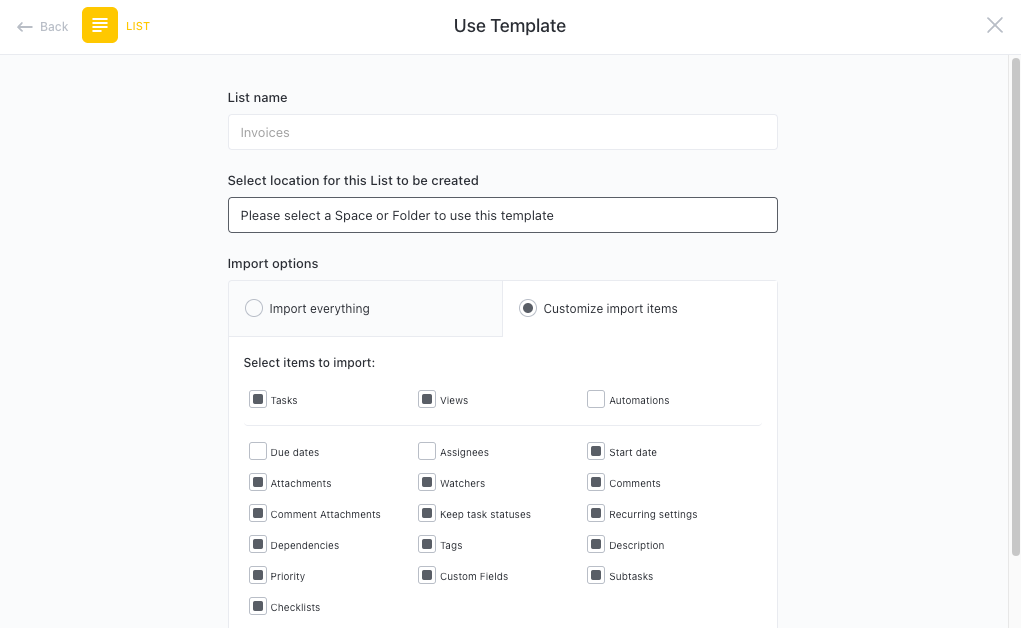Running a grocery store involves navigating a multitude of risks that can impact the success and reputation of your business. From ensuring food safety to managing supply chain disruptions, it's crucial to have a comprehensive risk management system in place. That's where ClickUp's Grocers Risk Register Template comes in handy.
With ClickUp's Grocers Risk Register Template, you can:
- Identify and assess potential risks specific to the grocery industry
- Create a centralized hub for tracking and managing these risks effectively
- Implement proactive measures to mitigate risks and maintain business continuity
- Stay compliant with regulations and industry standards
Keep your grocery store running smoothly and safeguarded against risks with ClickUp's Grocers Risk Register Template. Get started today and ensure the safety and sustainability of your business.
Benefits of Grocers Risk Register Template
Running a grocery store comes with its fair share of risks, which is why a Grocers Risk Register Template is essential for ensuring the safety and success of your business. This template offers a range of benefits, including:
- Identifying potential risks specific to the grocery industry
- Assessing the severity and likelihood of each risk to prioritize mitigation efforts
- Implementing proactive measures to prevent or minimize the impact of identified risks
- Monitoring and reviewing risks regularly to maintain a safe and compliant operation
- Enhancing decision-making by having a comprehensive overview of potential risks
- Demonstrating compliance with industry regulations and standards to customers and stakeholders
Main Elements of Grocers Risk Register Template
ClickUp's Grocers Risk Register template is designed to help you efficiently manage risks in your grocery business. Here are the main elements of this template:
- Custom Statuses: Track the progress of each risk with 9 different statuses, including Occurred, Mitigated, and Active, to stay on top of potential issues and their resolutions.
- Custom Fields: Capture important details about each risk, such as Consequence, Description, Expected Cost of Risk, Mitigation Cost, Probability, Risk Level, and Risk Response, to assess and prioritize risks effectively.
- Custom Views: Utilize 6 different views, including Costs of Risks, List of Risks, Risks by Status, Risks by Response, Risks by Level, and the Getting Started Guide, to gain valuable insights, monitor risk trends, and access step-by-step instructions on how to get started with the template.
- Collaboration Tools: Collaborate with your team by assigning tasks, setting due dates, attaching files, and leaving comments within each risk item, to ensure everyone is aligned and working towards risk mitigation.
How to Use Risk Register for Grocers
Managing risk in the grocery industry is crucial to ensure the safety and success of your business. By using the Grocers Risk Register Template in ClickUp and following the steps below, you can identify and mitigate potential risks, protecting your store and customers.
1. Identify potential risks
Start by identifying the different types of risks that your grocery store may face. This can include things like food safety, supplier issues, equipment failure, or even natural disasters. Brainstorm with your team and make a list of all the potential risks that could impact your business.
Use a Table view in ClickUp to create a list of potential risks and categorize them for easy reference.
2. Assess the likelihood and impact
Once you have identified the risks, assess the likelihood and potential impact of each risk. Determine how likely it is to occur and the potential consequences it could have on your business. This step will help you prioritize which risks to focus on and allocate resources accordingly.
Use custom fields in ClickUp to assign a likelihood and impact rating to each risk, allowing you to easily analyze and prioritize them.
3. Develop risk mitigation strategies
Now that you have identified and assessed the risks, it's time to develop strategies to mitigate or minimize them. This can include implementing safety protocols, conducting regular equipment maintenance, establishing backup suppliers, or creating emergency response plans. Each risk should have a corresponding mitigation strategy to address it.
Create tasks in ClickUp to outline the specific steps and actions needed to implement each mitigation strategy.
4. Monitor and review
Managing risk is an ongoing process, so it's important to regularly monitor and review your risk register. Keep track of any changes or new risks that may arise, and update your mitigation strategies accordingly. Regularly reviewing your risk register will help ensure that you are staying proactive in managing potential risks.
Set recurring tasks in ClickUp to remind you and your team to review and update the risk register on a regular basis.

Get Started with ClickUp’s Grocers Risk Register Template
Grocery store owners and managers can use this Grocers Risk Register Template to effectively manage and mitigate potential risks in their operations.
First, hit “Add Template” to sign up for ClickUp and add the template to your Workspace. Make sure you designate which Space or location in your Workspace you’d like this template applied.
Next, invite relevant members or guests to your Workspace to start collaborating.
Now you can take advantage of the full potential of this template to manage risks effectively:
- Use the Costs of Risks View to assess the financial impact of each identified risk
- The List of Risks View will help you keep track of all identified risks in one place
- Use the Risks by Status View to monitor the current status of each risk, such as Occurred, Mitigated, Active
- The Risks by Response View will help you track the actions taken to mitigate each risk
- Use the Risks by Level View to prioritize and categorize risks based on their potential impact
- The Getting Started Guide View will provide you with step-by-step instructions on how to effectively use this template
- Organize risks into nine different statuses: Occurred, Mitigated, Active, to keep track of their progress
- Update statuses as you address and mitigate each risk to ensure stakeholders are informed
- Monitor and analyze risks to ensure the safety and sustainability of your grocery store.








